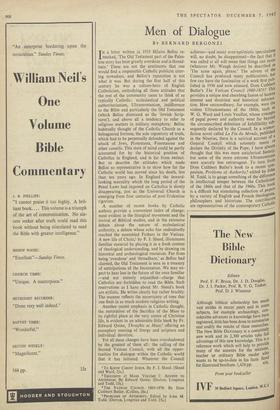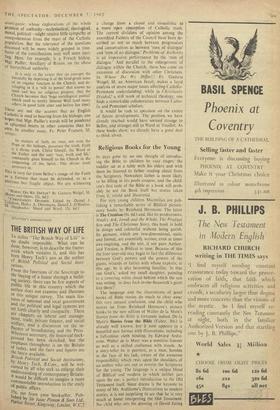Men of Dialogue
BY BERNARD BERGONZI N a letter written in 1935 Hilaire Belloc re- I marked, The Old Testament part of the Pales- tine story has been greatly overdone and is thread- bare.' These are not the sentiments that one would find a responsible Catholic publicist utter- ing nowadays, and Belloc's reputation is not what it was. But during the first half of this century he was a culture-hero of English Catholicism, embodying all those attitudes that the rest of the community came to think of as typically Catholic: ecclesiastical and political authoritarianism, Ultramontanism, indifference to the Bible and particularly the Old Testament (which Belloc dismissed as the 'Jewish Scrip- tures'), and above all a tendency to refer to religious matters in military metaphors: Belloc habitually thought of the Catholic Church as a beleaguered fortress, the sole repository of truth, which had to be perpetually defended against the attack of Jews, Protestants, Freemasons and other canaille. This state of mind could be partly accounted for by the historical position of Catholics in England, and is far from extinct. But to describe the attitudes which made Belloc so representative is to show how far the Catholic world has moved since his death, less than ten years ago. In England the inward- looking mentality which the long period of the Penal Laws had imposed on Catholics is slowly disappearing, just as the Universal Church is emerging from four centuries of post-Tridentine rigorism.
A number of recent books by Catholic authors provide a convenient index of change; most evident in the liturgical movement and the revival of Biblical studies, and in the extensive debate about the nature of ecclesiastical authority, a debate whose echo has undoubtedly reached the assembled Fathers in the Vatican. A new life of Christ,' by F. J. Sheed, illuminates familiar material by placing it in a fresh context of theological understanding, and by drawing on historical and archxological resources. Far from being 'overdone' and 'threadbare,' as Belloc had claimed, the Old Testament is seen as a treasury of anticipations of the Incarnation. We may ex- pect to hear less in the future of the once familiar —and not entirely unjustified----charge that Catholics are forbidden to read the Bible. Such reservations as I have about Mr. Sheed's book are stylistic. He writes clearly but rather brashly. The manner reflects the uncertainty of tone that one finds in so much modern religious writing.
Another recent emphasis in Catholic thought, the restoration of the Sacrifice of the Mass to
its rightful place at the very centre of Christian life, is evident in an admirable little bbok by Fr. Edward Quinn, Thoughts at Mass,' offering an exemplary meeting of liturgy and scripture and individual devotion.
Yet all these changes have been overshadowed by the greatest of them all : the calling of the Second Vatican Council, with all the oppor- tunities for dialogue within the Catholic world that it has initiated. Whatever the Council
1To KNow CHRIST JESUS. By F. J. Sheed. (Sheed and Ward, 21s.) 'THOUGHTS AT MASS. VOLUME I: ADVENT TO ASCENSION. By Edward Quinn. (Darton, Longman and Todd, 15s.) 'THE VATICAN CouNcrt. 1869-1870. By Dom Cuthbert Butler. (Collins, 36s.) • PROBLEMS OF AUTHORITY. Edited by John M. Todd. (Darton, Longman and Todd, 25s.) achieves—and many over-optimistic speculations will, no doubt, be disappointed—the fact that it was called at all will mean that things can never (whatever Mr. Waugh desires) be described as `The same again, please.' The advent of the Council has produced many publications, but few can have the fascination of a work first pub' lished in 1930 and now reissued, Dom Cuthbert Butler's The Vatican Council 1869-1870.' Tb's provides a unique and absorbing fusion of human interest and doctrinal and historical informs' tion. How extraordinary, for example, were the violent Ultramontanes of the 1860s, such as W. G. Ward and Louis Veuillot, whose concepts of papal power and authority went far beyond the circumscribed definition of Infallibility sub- sequently declared by the Council. In a science• fiction novel called La Fin du Monde, published in the Nineties, there is a satirical account of a General Council which solemnly meets 1° declare the Divinity of the Pope; I have always thought that this was mere anticlerical fantasy, but some of the more extreme Ultramontanes were scarcely less extravagant. To turn from Dom Cuthbert Butler's book to a recent syny posium, Problems of Authority,' edited by John M. Todd, is to gauge something of the difference in intellectual temper between the Catholicism of the 1860s and that of the 1960s. This book is a difficult but stimulating collection of papers by a variety of English and French theologians, philosophers and historians. The contributors are representatives of the contemporary Catholic avant-garde, whose explorations of the whole problem of authority—ecclesiastical, theological, moral, political—might receive little sympathy or comprehension from the mass of the Catholic Population. But the relevance of the questions discussed will be more widely grasped in time. Some of the contributions may well seem start- ling, Here, for example, is a French bishop, Mgr. Pallier, Auxiliary of Rouen, on the abuse of hierarchical authority: It is only to the extent that sin corrupts the hierarchy by depriving it of the God-given sense of its organic function in the Church, and de- veloping in it a 'will to power that knows no limit and has no religious purpose, that the Church becomes that `huge sociological animal' which used to terrify Simone Weil (and many others in good faith after and before her time).
• These are not the accents that an English Catholic is used to hearing from his bishops; one hopes that Mgr. Pailler's words will be pondered in episcopal hearts in other countries than his 'm.o. In another essay, Fr. Peter Fransen, SJ, writes: In matters of faith, no man, not even the
is or the bishops, possesses the truth. Faith is a divine truth. Christ himself, the Word of the Father and the only `way, truth and life,' Continually gives himself to .his Church in the outpouring of his Spirit. This divine truth Possesses us.
This is very far from Belloc's image of the Faith as a fortress that must be defended, or as a Precious but fragile object. We are witnessing WHERE Do WE DIFFER? By Gustave Weigel, Si. -(Burns and Oates, 12s. 6d.) . _ CHRISTIANITY DIVIDED. Edited by Daniel J. allahan, Heiko A. Obermann, Daniel J. 0.1-Janlon. ,y (Stagbooks : Sheed and Ward, 12s. 6d.) a change from a closed and monolithic to a more open conception of Catholic truth. The current divisions of opinion among the assembled Fathers of the Council have been de- scribed as not so much between progressives and conservatives as between 'men of dialogue' and 'men of no dialogue.' Problems of Authority is an impressive performance by the 'men of dialogue.' And parallel to the enlargement of dialogue within the Church, there has come an extension of discussion with other Christians. In Where Do We Differ?,' Fr. Gustave Weigel, SJ, an American Jesuit, makes a lucid analysis of seven major issues affecting Catholic- Protestant understanding; while in Christianity Divided,6 a stiff work of technical theology, one finds a remarkable collaboration between Catho- lic and Protestant scholars.
It would be rash to speculate on the extent of future developments. The position we have already reached would have seemed strange to Belloe, and stranger still to Ward or Veuillot. As these books show, we already have a great deal to think about.







































 Previous page
Previous page